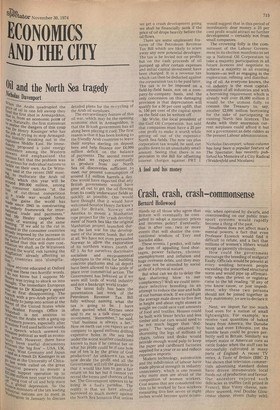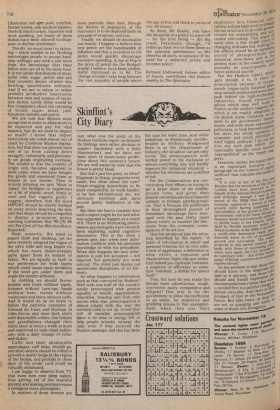Crash, crash, crash—commonsense
Bernard liollowood
Hands up all those who agree that Britain will eventually •be compelled to adopt a statutory prices and incomes policy! Eventually; that is after one, two or more events that will shatter the conventional wisdom of Tory and Socialist alike.
These events, I predict, will take the form of appalling food shor
tages, power failures, chronic unemployment and inflation and huge overseas debts, and they may or may not be attended by social strife of ,a physical nature.
But what can we do to delay the first shattering blow to. our complacency? Well we could introduce selective breeding inan attempt to reduce the size and bulk of our human stock. If we could get the average male down to five feet in height and about eight stones in weight we could save vast amounts of food and textiles. Houses could be built with fewer bricks and less timber and our cars would need to be not much bigger than 'dodgems.' The wood obtained by shortening the legs of millions of chairs, tables and desks would provide enough wood pulp to keep the paper and cardboard factories supplied for a year or so and reduce expensive imports.
Modern technology, automation and the subdivision of labour have made physical strength in industry unnecessary, which is one reason why many men are afraid of the competition of women workers. Coal seams that are considered too thin to be worked by face workers measuring five feet seven or eight inches would become quite econo
mic when operated by dwarfs, and . overcrowding on our public transport systems would rapidly become a thing of the past.
Smallness does not affect man's mental powers, a fact that even Professor Eysenck would find it difficult to refute, and a fact that millions of women's libbers would accept as patently obviously. How could the government encourage the breeding of midgets? Easily. Officials would be present at every wedding between people exceeding the prescribed structural norm and would pipe up affirmatively when the priest or registrar came to the bit reading "If any of you know cause, or just impediment, why these two persons should not be joined together in holy matrimony, ye are to declare it
. .11
Next, we import far too much food even for a nation of small lightweights. For example, we receive vast quantities of baked beans from America, the Danube basin and even Ethiopia,. yet the humble bean could be grown perfectly well in Britain. Similarly we import maize or American corn as cattle fodder when the stuff can be successfully cultivated in many parts of England. A recent TV series, A Taste of Britain (BBC 2) has shown that television commercials advertising standard dishes have driven innumerable local foods out of production and favour. Our ancestors enjoyed such delicacies as truffles (still prized in France), Blue Vinny cheese, samphire seaweed, real Double Gloucester cheese, elvers (baby eels), Gloucester old spot pork, crayfish, Dorset knobs, oak-smoked kippers, Norfolk black turkey, liquorice and dock pudding, yet many of these dishes have been allowed to disappear or decline alarmingly.
Thirdly, we must resort to rationing – black market or no. Nothing encourages people to accept hard ship willingly and with a jest more than the knowledge that their fellow men are all in the same boat.
It is the unfair distribution of meat, toilet rolls, sugar, petrol and salt that converts decent citizens into howling, quarrelsome militants. And if we are to ration or rather prohibit productive intercourse between men and women of excessive inches, surely there would be few complaints about the rationing of bread, sugar, meat, jam, furniture, textiles and petrol.
We are told that Britons must accept less in order to allow more to be exported and pay for vital imports, but do we need to import so much? I know that import restrictions are ruled almost out of court by Common Market legislation, but that does not prevent each one of us from cutting down savagely, voluntarily and personally on goods originating overseas.
The trouble is that the country of origin only becomes apparent in most cases when we have bought the goods and examined them at leisure in our homes. Then in minute lettering we spot `Made in Japan' (or Solingen or Argentina) on a bit of plastic, wood, fabric or steel and feel vaguely guilty. I suggest, therefore, that the word IMPORT should be clearly marked on every article deserving the title
and that shops should be compelled to display a prominent notice warning customers that '-60 (70, 80 etc) Per Cent of Our Merchandise is Imported.'
Next, austerity. We need to export cloth and clothing, yet we have recently adopted the vogue of the ultra wide and long kipper tie which has many disadvantages quite apart from its misuse of fabric. We are equally at fault in our preference for wide lapels which could cause nasty accidents if the wind got under them and made the wearer airborne.
In clothing we should favour jackets and coats without lapels, trousers without turn-ups, heads without hats, waists without waistcoats and shirts without cuffs.
And it would do us no harm to follow the patriotic examples of Edward du Cann and Norman St John-Stevas and wear dark shirts with detachable collars. Our fathers and grandfathers changed their shirts once or twice a week at most and contrived to look clean sartorially with a daily change of collar and dickey.
Cuffs and their abominable appendages, cuff links, should go, and shirt-sleeves should be rolled to provide a manly bulge in the region, of the biceps, and pockets in these days of the credit card could be virtually eliminated.
I am happy to observe from TV that most men now sleep naked, thus getting rid of the wasteful pyjama and making permissiveness a smidgeon more photogenic.
In matters of dress women are more patriotic than men, though the decline in popularity of the microskirt is to be deplored both on grounds of economy and lust.
Finally we should de-decimalise our money. I happen to believe that new pence are the handmaiden of inflation and that a reversion to old pence would quickly discourage excessive spending. A rise of 81/2p in the price of petrol (in the Budget) would, I believe, have been unthinkable expressed as Is 8d. The change wouldn't take long because the vast majority of people above the age of five still think in terms of our old money.
So there, Mr Healey, you have the blueprint of a policy to stave off — for the time being — the big crash. Personally, though, I'd rather go bust two or three times as the essential preliminary to the cheerful all-party acceptance of the need for a statutory prices and incomes policy.
Bernard Hollowood, former editor of Punch, contributes this feature weekly to The Spectator











































 Previous page
Previous page